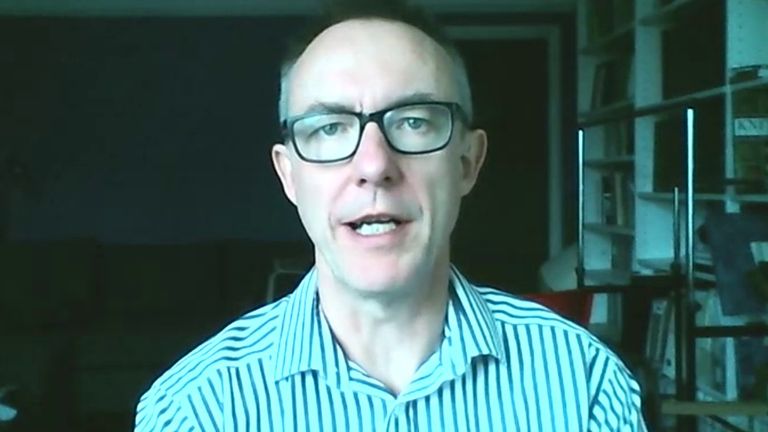Coronavirus: Seven things to watch out for in Sunak's stimulus statement
Sky's economics editor asks what COVID-19 crisis medicine the Chancellor can dispense in his statement to MPs.
Wednesday 8 July 2020 08:08, UK
Over the past few months, millions of us have been directly affected by the unprecedented coronavirus support schemes unleashed by the Treasury.
Now, as the COVID-19 lockdown is eased and Britain attempts to return to some form of normality, Number 11 is preparing another round of measures to stimulate the economy.
So what should we expect and look out for from the chancellor? Here are seven key things to bear in mind.
1. It is not a 'fiscal event'
The Treasury is very keen to emphasise this point - perhaps because speculation has grown and grown about the scale of the thing.
In the past couple of weeks there have been all sorts of stories about possible measures in the papers - everything from VAT cuts to stamp duty holidays.
Now, it's not out of the question we get some measures along those lines, but the Treasury wants to ensure people don't get carried away.
What does it mean in practice that it's not a "fiscal event"?
It means that there won't be the usual bits and pieces that go alongside Budgets and Autumn Statements - formal economic forecasts from the Office for Budget Responsibility, crucial decisions about duties and rates. Just a document from the Treasury with as much or as little detail as they choose to give us about its schemes.
2. It will have jobs at the heart of it
This is likely to be the worst period for UK unemployment in decades - most likely since the 1990s or even the 1980s.
So, much of the chancellor's focus will be on attempting to safeguard jobs.
Expect to hear about schemes to keep people in work, schemes to help boost skills and get youngsters into work (after all, youth unemployment is likely to rise even faster than the overall figure).
One of those measure we now know about is a new "Kickstart" scheme, in which the government will help finance work placements for young people just out of school and university.
3. The high street will feature too
One question worrying the Treasury is whether people will indeed flock back to shops, pubs and restaurants as lockdown is eased.
The early evidence suggests many people remain nervous about going out and spending.
So expect further measures from the Treasury to try to encourage spending: perhaps a voucher scheme to incentivise restaurant bookings, perhaps tax breaks for shops or indeed the hospitality industry.
4. Lots about shovel-ready projects
The prime minister confirmed the other day that there will be more money spent (well, actually already-pledged money spent a bit earlier) on schools, roads and hospitals.
The chancellor has also put a further £3bn towards home insulation and other green projects.
Expect more on infrastructure alongside this - after all, the government is hoping that a big boost in infrastructure spending kills two birds with one stone: both providing jobs for those who are out of work and boosting economic growth.
Indeed, the prime minister even said the other day that such schemes should lift productivity which in turn will generate extra tax revenue. Which brings us to number five...
5. Debt, debt, debt
These measures will all cost a lot of money. And pile that on top of the hundreds of billions of pounds it is already expecting to borrow this year and pretty soon you're talking about an eye-watering amount of government debt.
Is this the moment to start thinking about how we pay it off? In short, no.
Don't expect all that much from the chancellor about future tax rises or spending cuts to finance this. He and the Treasury have half an eye on that, but may save that for later in the year, or perhaps even next year.
:: Listen to The World Tomorrow on , ,
6. This is only Act Two
To use a theatrical analogy, try to think of the big economic interventions this year in terms of three acts.
Act One was the emergency measures early on in the crisis: the Budget, the furlough schemes, the loan guarantees for companies and so on.
This week will bring Act Two, in which the chancellor begins to sketch out how he can stimulate the economy out of lockdown.
But the Treasury is at pains to emphasise that this will probably all pale into comparison with Act Three, which we can expect later on this year in the form of the Autumn Statement: a full "fiscal event" with changes to tax, spending and even an economic forecast for the coming years.
Whether it will be any more reliable than the one in the last Budget will remain to be seen.
7. Don't forget the politics
There is nothing new about tension between Number 10 and Number 11 Downing Street. Typically the prime minister likes to spend money and the chancellor likes to keep spending in check.
And that dynamic is again bubbling beneath the surface.
While the PM would rather like the Treasury to throw everything they've got at the economy, the attitude on Horse Guards Road is characteristically tentative.
After all, it still isn't sure how consumers will react to the end of lockdown. So to some extent officials have been keen to keep their powder dry.
There will be eye-catching policies but to some extent the real litmus test of this event is how many rabbits the chancellor can pull out of his hat without actually spending too much money.









